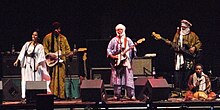| Desert blues | |
|---|---|
 | |
| Native name | Tishoumaren, assouf |
| Other names |
|
| Stylistic origins | |
| Cultural origins | From 1980s to 1990s, Tuareg people in North Africa, West Africa and Sahara regions |
| Typical instruments | |
| Regional scenes | |
Tishoumaren (ⵜⵉⵛⵓⵎⴰⵔⴻⵏ in Neo-Tifinagh script) or assouf,[1] internationally known as desert blues, is a style of music from the Sahara region of northern and west Africa. Critics describe the music as a fusion of blues and rock music with Tuareg, Malian or North African music.[2] Various other terms are used to describe it[1] including desert rock, Saharan rock,[3] Takamba,[2] Mali blues,[4] Tuareg rock[5] or simply "guitar music".[6] The style has been pioneered by Tuareg musicians in the Sahara region, particularly in Mali, Niger, Libya, Algeria, Burkina Faso and others; with it also being developed by Sahrawi artists in Western Sahara.[7]
The musical style took shape as an expression of the culture of the traditionally nomadic Tuareg people, amid their difficult sociopolitical situation, including rebellions, widespread displacement and exile in post-colonial Africa.[7] The word Tishoumaren is derived from the French word chômeur, meaning "the unemployed".[1]
The genre was first pioneered by and popularized outside of Africa by Ali Farka Touré and later Tinariwen. In recent years, artists like Mdou Moctar and Bombino have continued to adapt Saharan rock music and have achieved international success.[8][2][3][9][7]
- ^ a b c Cite error: The named reference
morganwas invoked but never defined (see the help page). - ^ a b c J. D. (11 April 2019). "The virtuosity of Mdou Moctar, the "Jimi Hendrix of the Desert"". The Economist. Retrieved 3 February 2020.
- ^ a b Pareles, Jon (2010-02-19). "Hot Breath of Saharan Rock Blows in From Africa (Published 2010)". The New York Times. ISSN 0362-4331. Retrieved 2021-02-04.
- ^ Kenny, Glenn (2017-06-29). "Review: 'Mali Blues,' Making Music in the Face of Jihadists (Published 2017)". The New York Times. ISSN 0362-4331. Retrieved 2021-02-03.
- ^ Morgan, Andy (9 June 2016). "Meet Kel Assouf and Imarhan, the new wave of Tuareg rock". The Guardian. Retrieved 3 February 2020.
- ^ Rasmussen, Susan J. (7 April 2019). "Between Several Worlds: Images of Youth and Age in Tuareg Popular Performances". Anthropological Quarterly. 73 (3): 133–144. doi:10.1353/anq.2000.0007. JSTOR 3317938.
- ^ a b c "Rebel Blues in the Sahara: A Desert Guitar Primer". Pitchfork. 25 March 2008. Retrieved 2021-02-04.
- ^ The Rough Guide to Desert Blues - Various Artists | Songs, Reviews, Credits | AllMusic, retrieved 2021-02-03
- ^ Rubin, Mike (2018-05-17). "How Bombino Became the Sultan of Shred (Published 2018)". The New York Times. ISSN 0362-4331. Retrieved 2021-02-04.